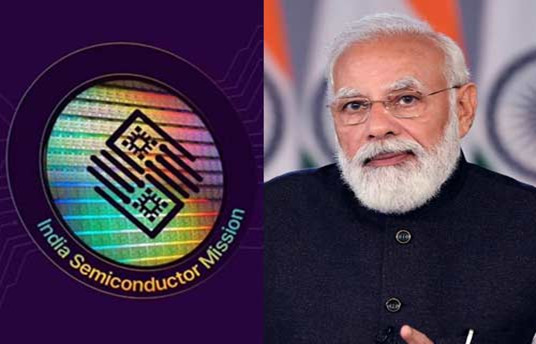India’s semiconductor manufacturing landscape is undergoing a significant transformation due to recent strategic investments and initiatives aimed at strengthening the country’s technological capabilities and economic resilience. These developments mark a critical step in India’s journey toward self-reliance in semiconductor production, a crucial aspect in the digital age. The ‘Make in India’ campaign is fostering an environment conducive to indigenous semiconductor manufacturing capabilities.
The recent greenlighting of major semiconductor projects, such as those led by Tata Electronics Pvt Ltd and Foxconn in collaboration with the HCL Group, signifies a shift in India’s approach to semiconductor manufacturing. These efforts not only indicate a move towards reducing reliance on imported semiconductor products but also position the nation as a significant player in the global semiconductor market. The funding, partnerships with global players, and the focus on advanced technologies like chip fabrication and packaging underline India’s commitment to technological innovation and self-reliance.
The impact of these developments extends beyond technological advancements. The establishment of these units is anticipated to create a substantial number of job opportunities, directly and indirectly, thus significantly impacting employment generation in advanced technology sectors. The ripple effects are expected to stimulate growth across various industries, from automotive to electronics and industrial manufacturing, catalyzing economic development and fostering a favorable environment for innovation and research. These initiatives represent a strategic move towards establishing India as a prominent player in semiconductor manufacturing on the global stage. The concerted efforts to build a robust semiconductor ecosystem are part of a broader vision to propel India to the forefront of technological innovation and establish the country as a key player in shaping the future of the semiconductor industry.
Under the ‘Development of Semiconductors and Display Manufacturing Ecosystem’ initiative, the government is allocating up to Rs 76,000 crore in funding. Tata Electronics Pvt Ltd is collaborating with Taiwan’s Powerchip Semiconductor Manufacturing Corp to establish a semiconductor fab in Dholera, Gujarat. This facility is expected to have a production capacity of 50,000 wafers per month, requiring an investment of Rs 91,000 crore. Additionally, Tata Semiconductor Assembly and Test Pvt Ltd (TSAT) will construct a semiconductor unit in Morigaon, Assam, with an investment of Rs 27,000 crore. The Assam unit is projected to manufacture 48 million chips daily, catering to various sectors such as automotive, electric vehicles, consumer electronics, telecom, and mobile phones. Lastly, the CG Power Semiconductor unit will focus on producing 15 million chips for applications in consumer electronics, industrial machinery, automotive systems, and power equipment.
The government recently greenlit three significant semiconductor projects tallying to a substantial investment of Rs 1.26 lakh crore under the ‘Development of Semiconductors and Display Manufacturing Ecosystem’ initiative. One of the units, established by CG Power in partnership with Renesas Electronics Corp and Stars Microelectronics of Thailand, is set to be located in Sanand, Gujarat, with an investment of Rs 7,600 crore. This move signifies India’s strategic plan to strengthen its semiconductor capabilities domestically and decrease reliance on chip imports from other countries. Prime Minister Modi has emphasized that this endeavor is aimed at positioning India as a leading global hub in semiconductor production, instilling self-reliance in this crucial technological domain.
The recent decision by the Indian government to invest in domestic semiconductor manufacturing is a strategic step towards enhancing the country’s technological independence and reducing its dependence on imported semiconductor products. This initiative is in line with Prime Minister Narendra Modi’s vision to establish India as a global leader in semiconductor production, recognizing the significant role of semiconductors in today’s digital economy.
In the current global context, semiconductors have become a crucial component in various technological applications, ranging from consumer electronics to industrial machinery. Countries such as the US, Japan, and China have prioritized the development of their domestic semiconductor capabilities, recognizing the strategic importance of this industry. Through this investment, India aims to strengthen its position in the global semiconductor market, which is forecasted to reach $63 billion by 2026. The planned construction of semiconductor plants within the next 100 days highlights the government’s commitment to accelerating the development of indigenous high-performance computer chips and other semiconductor products essential for a wide range of applications.
This initiative is expected to generate numerous job opportunities, foster innovation and research in the semiconductor sector, and potentially attract additional investments in related technologies and industries. Ultimately, this move showcases India’s resolve to achieve self-sufficiency in semiconductor production and establish itself as a prominent player in the global semiconductor arena.
In agreement to the previously approved semiconductor manufacturing projects, Foxconn, a prominent electronics manufacturer from Taiwan, is reportedly seeking bids for the establishment of a semiconductor assembly and testing facility in India. The proposed plant is anticipated to be a collaboration with the HCL Group, with an initial investment pledge of Rs 1,200 crore. Foxconn’s subsidiary, Foxconn Hon Hai Technology India Mega Development Pvt Ltd, is spearheading this effort and intends to invest $37.2 million to secure a 40 percent stake in the joint venture. This marks Foxconn’s entry into the Indian semiconductor landscape, following the conclusion of its previous collaboration with the Vedanta Group. It’s worth noting that both Vedanta and Foxconn have announced their individual plans to establish their own chip plants in India.
The establishment of four major semiconductor units in India is a significant step towards creating a robust semiconductor ecosystem within the country. These units will contribute to India’s capabilities in chip fabrication and the development of advanced packaging technologies, complementing the existing strength in chip design. The implementation of these units is expected to result in the creation of approximately 20,000 direct jobs focused on advanced technology, while also generating around 60,000 indirect employment opportunities. This development is likely to have a far-reaching impact on various industries, including downstream sectors such as automotive, electronics manufacturing, telecom, industrial manufacturing, and many other areas that heavily rely on semiconductor technologies. These advancements are poised to significantly bolster India’s position in the semiconductor landscape, fostering technological capabilities and promoting economic growth through job creation and industry development. Tata’s initiative will support Prime Minister ‘Make in India’ campaign for electronics manufacturing, contributing to India’s ascent as the world’s second-largest producer of smartphones.
The recent developments in semiconductor manufacturing in India are set to enhance the country’s technological capabilities, reduce dependence on imports, and drive self-reliance in the semiconductor industry. These advancements are expected to spur innovation across various sectors, create significant job opportunities, and position India as a competitive player in the global semiconductor market. Overall, these initiatives demonstrate the potential for India to lead in semiconductor technology, driving economic growth and fostering domestic expertise in key technological fields.
About the authors:
Alok Virendra Tiwari:
Alok Virendra Tiwari holds a bachelor’s degree in political science from Mumbai University. He was part of Delegate Affairs Team of Youth 20 (Y20). He is currently part of the Chanakya Fellowship in Social Sciences at Chanakya University, Bengaluru. Views expressed are personal.
Soma Mangnaanii:
She holds a Bachelors degree in Art History from Boston University .She is Managing Trustee of Muktangan International foundation. Views expressed are personal.
(The views expressed are the author's own and do not necessarily reflect the position of the organisation)


